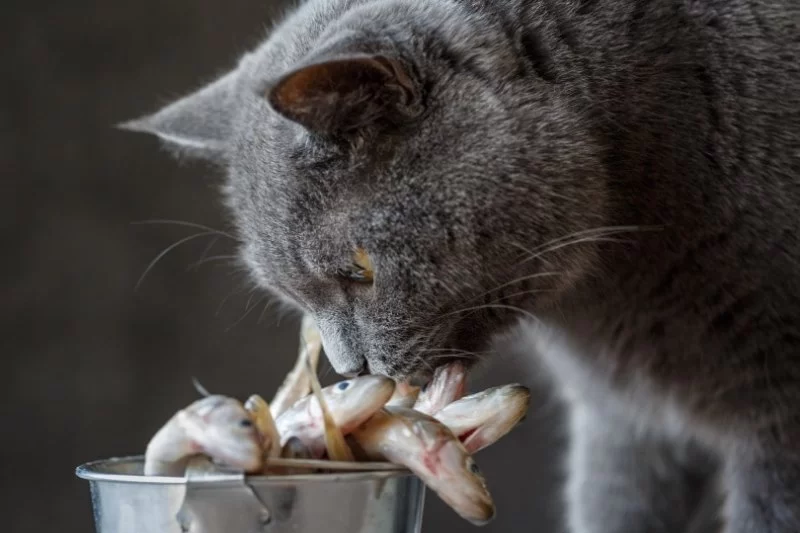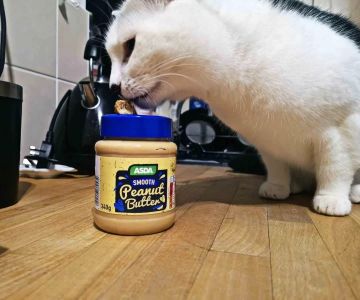- 1. Introduction to Feeding Cats Fish
- 2. The Benefits of Fish for Cats
- 3. Safe Fish Options for Cats
- 4. Risks and Considerations When Feeding Fish to Cats
- 5. How to Prepare Fish for Your Cat
- 6. Real-Life Example: Feeding Fish to Cats
- 7. How Hidden Brook Veterinary Can Help You Choose Safe Fish for Your Cat
1. Introduction to Feeding Cats Fish
As pet owners, we often want to treat our cats to delicious food, and fish is a popular choice. Cats, being obligate carnivores, enjoy a variety of meats, and fish is a high-protein option that can provide beneficial nutrients. However, not all fish is safe for cats, and it’s important to understand which types are appropriate to feed your furry friend.
This article will help you navigate which fish can be safely included in your cat’s diet, as well as provide guidance on how to feed fish to cats in a healthy way. Understanding these factors will ensure your cat enjoys the benefits of fish without the risks.
2. The Benefits of Fish for Cats
Fish is a good source of high-quality protein, essential fatty acids, and other nutrients that are beneficial to cats. Some of the key benefits of feeding your cat fish include:
- High in Omega-3 Fatty Acids: Fish like salmon and sardines are rich in omega-3 fatty acids, which are beneficial for skin health, coat shine, and reducing inflammation. Omega-3s also support joint health and cognitive function.
- Rich in Protein: Cats require a protein-rich diet to maintain muscle mass and overall health. Fish provides a lean protein source that is easily digestible for cats.
- Vitamin D: Certain types of fish, like salmon, are rich in vitamin D, which helps with bone health and calcium absorption.
Including fish in your cat’s diet can also provide them with a tasty treat that appeals to their natural carnivorous instincts. However, it’s important to know that while fish offers many benefits, not all fish are safe for cats to eat.
3. Safe Fish Options for Cats
When choosing fish to feed your cat, it's crucial to pick varieties that are safe, nutritious, and free from harmful substances like mercury. Some fish are better suited for cats than others. Here are a few safe options:
- Salmon: A favorite for many cats, salmon is rich in omega-3 fatty acids and protein. However, it should be cooked thoroughly to avoid parasites.
- Sardines: Sardines are small fish that are packed with healthy fats and protein. They are often lower in mercury compared to larger fish, making them a safer choice for cats.
- Trout: Trout is another good fish option for cats. It’s a rich source of protein and omega-3s and is usually lower in mercury compared to other fish.
- Herring: Herring is also a great fish for cats, containing healthy fats, protein, and essential vitamins. Like sardines, herring is typically smaller, so the risk of mercury poisoning is lower.
- Cod: Cod is a mild-flavored fish that many cats enjoy. It’s a lean source of protein, and while it doesn’t have as many omega-3s as salmon, it’s still a healthy option when prepared properly.
4. Risks and Considerations When Feeding Fish to Cats
While fish can be a nutritious addition to your cat’s diet, there are several risks to consider when feeding fish to your pet:
- Mercury: Certain types of fish, especially larger fish like tuna and swordfish, can contain high levels of mercury, which can be toxic to cats. It's best to avoid these fish or feed them only occasionally.
- Bones: Fish bones pose a choking hazard and can cause injury to your cat’s digestive tract. Always ensure that the fish is boneless before serving it to your cat.
- Raw Fish: Feeding raw fish can expose your cat to harmful bacteria, parasites, and toxins. Always cook fish thoroughly to eliminate these risks.
- Imbalance in Diet: Fish should be given in moderation as part of a balanced diet. Relying too much on fish can lead to nutrient imbalances, as fish lacks certain essential nutrients that cats need, such as taurine.
5. How to Prepare Fish for Your Cat
To ensure your cat enjoys fish safely, follow these preparation tips:
- Cook Thoroughly: Always cook fish thoroughly to avoid any bacterial or parasitic infections. Steaming, boiling, or baking are good cooking methods.
- Remove Bones: Carefully remove all bones from the fish to prevent choking or injury to your cat's digestive system.
- Avoid Seasoning: Don’t add any salt, garlic, onions, or spices to the fish, as these can be harmful to cats.
- Serve in Moderation: Fish should be a treat and not a regular part of your cat’s diet. Serve it in small portions, mixed with their regular food to provide a balanced diet.
6. Real-Life Example: Feeding Fish to Cats
Meet Leo, a 7-year-old tabby who loves fish. His owner, Jessica, wanted to treat him to some healthy fish after reading about the benefits of omega-3 fatty acids. After consulting with her veterinarian at Hidden Brook Veterinary, Jessica decided to offer Leo cooked salmon as a special treat once a week. She always removes the bones and ensures the fish is thoroughly cooked to avoid any risks. Leo loves the treat, and Jessica has noticed that his coat looks shinier and healthier, a positive result of the omega-3s in the salmon.
This example shows that when fish is prepared properly and served in moderation, it can be a great addition to a cat’s diet, enhancing both their health and happiness.
7. How Hidden Brook Veterinary Can Help You Choose Safe Fish for Your Cat
If you're unsure about which fish is safe for your cat or how to incorporate it into their diet, Hidden Brook Veterinary is here to help. Our team of experienced veterinarians can guide you on the best food options for your cat, including which fish are most beneficial and how to prepare them safely.
Visit [Hidden Brook Veterinary] today for more advice on pet nutrition and to ensure your cat stays happy and healthy with the right diet.












